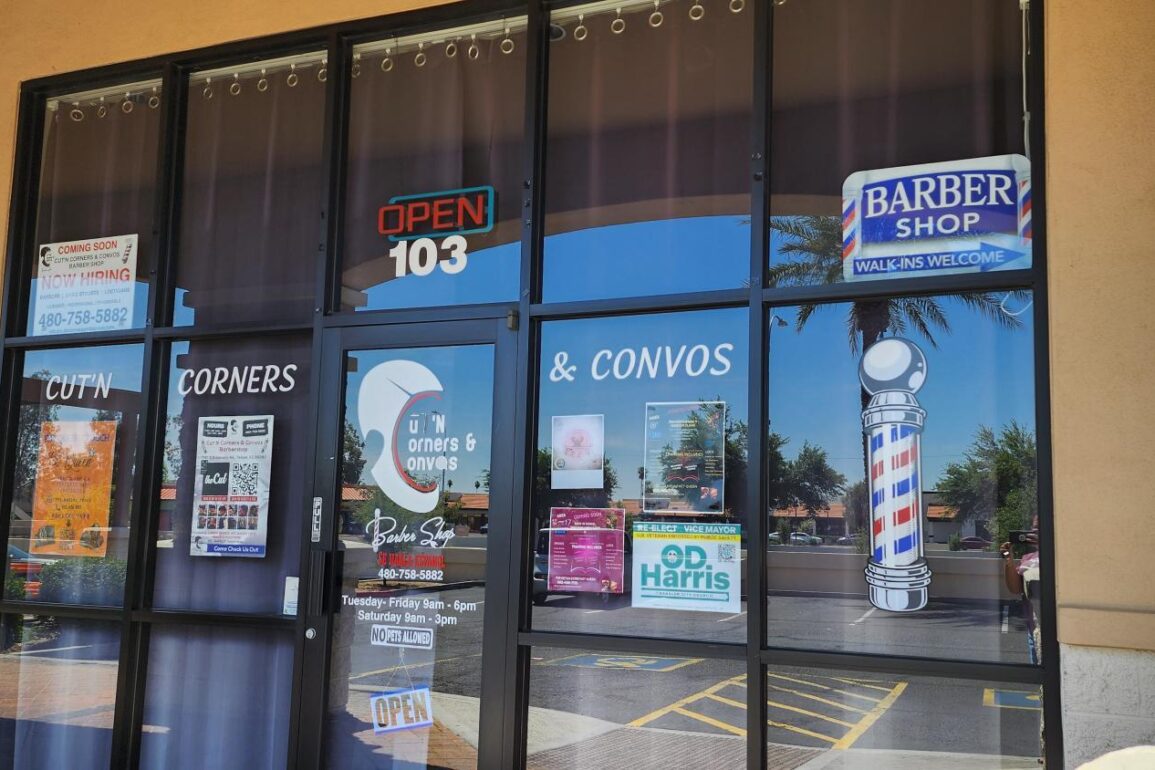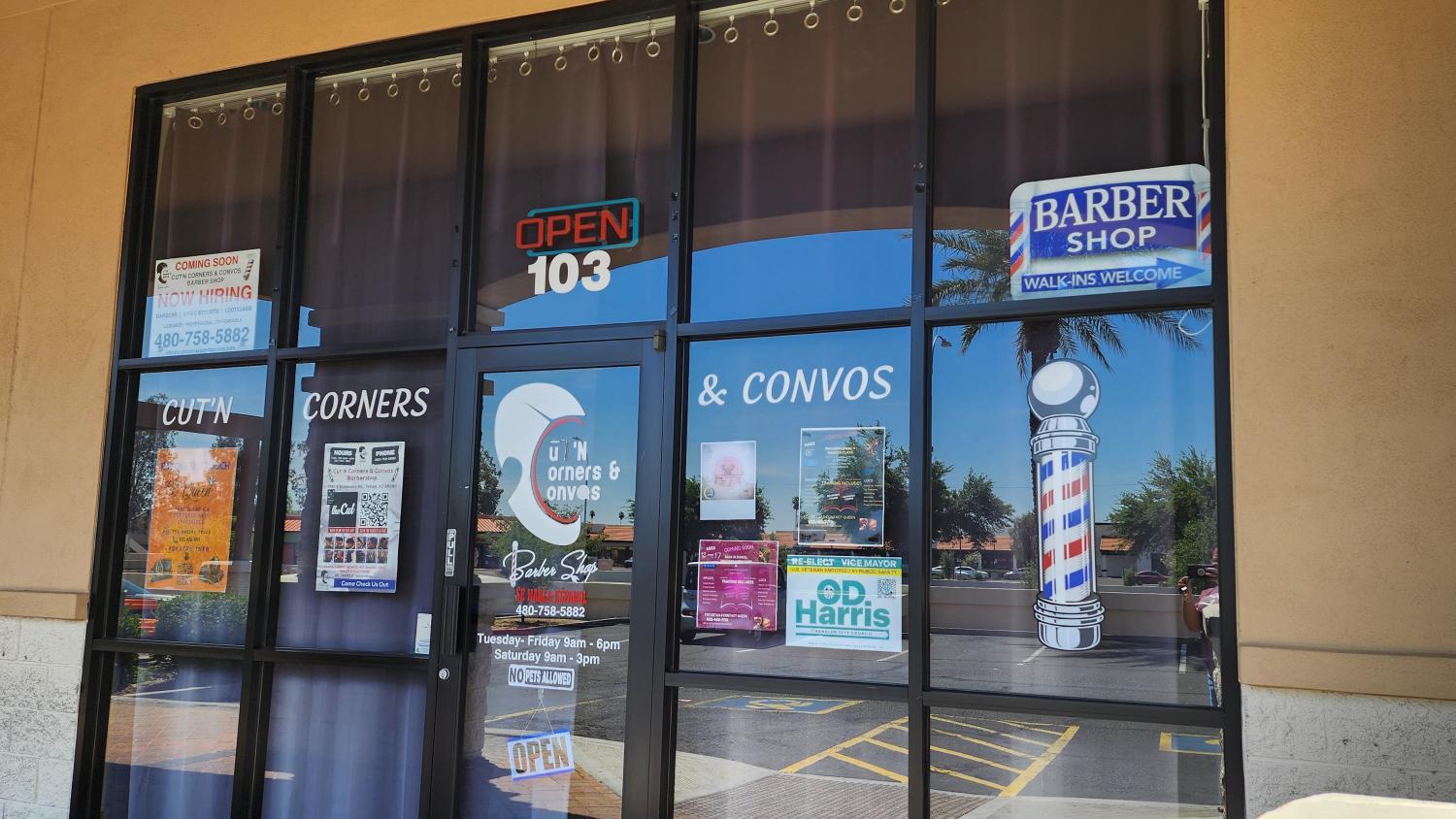Faith Johnson’s mother, Joy, owns Cut’n Corners & Convos Barber Shop in Tempe. The 22-year-old University of Arizona graduate is using it now to help start conversations about attention-deficit/hyperactivity disorder, autism, depression and aggression.
Johnson’s story is the subject of Greg Moore’s latest column in the Arizona Republic. Moore joined joined editorial page editor Elvia Díaz to talk about it.
Full interview
LAUREN GILGER: Good morning to you both.
ELVIA DÍAZ: Good morning.
GREG MOORE: Hey, good morning.
GILGER: All right. So Elvia, we have you on every Monday to talk about what’s in the opinion pages of the paper usually to do with politics. And this morning it’s a little bit different. So start with a little bit about why you wanted to talk about this story this week.
DÍAZ: Look, every single day we are inundated with topics that are so politically divisive. I mean, that’s the world that we live in. So we are focusing too much sometimes I, I think on, on a few characters in our political spectrum locally and nationally. And so this is a very different cow, and so the way that I see the opinion pages. You will see that we have more than that, more than just the political fight and, and, and the latest from the local political spectrum. So I, I definitely wanted to highlight this one because it’s such an important issue, Lauren. And again, once in a while and, I’m hoping to do a lot more, we dive into some deep issue shoes that we don’t necessarily have a hot opinion on it, but, which are incredibly important and this is one of them.
GILGER: Yeah. All right. So Greg, let’s talk about this particular barbershop and the people, you know, there, we have to start with a little disclosure. This is your barbershop, right?
MOORE: Yeah. Well, yeah, this is, this is where I’ve been going since they opened about three years ago. The owner operator Joy Johnson’s been my barber since I moved to Arizona. I moved here in 2011.
GILGER: A long time. All right. So tell us about her daughter Faith and this nonprofit that she started.
MOORE: Yeah. Faith is one of those achiever kids. So I’ve been hearing about her since, you know, since she was small. She’s one of those kids. She got internship at Mayo Clinic where she was volunteering at Mayo Clinic. She had a dream one night woke up, told her mom, “mom, I wanna be a doctor.” Mom said, OK, so they, they applied for a program, some program or another for kids at a hospital and they didn’t get it. Mom said, look, that’s just a setback. We’re gonna use this. Joy made Faith write out a resume, go get a business suit. She’s like 12 years old and they put it, put in for a, a program, they put in for a program at Mayo Clinic. Now, you know, Faith is like, look, I didn’t get in at this local hospital, there’s no way I’m getting in at Mayo. But something about the way faith presented herself, she shook hands, she looked people in the eye. She was very serious. She was a 12 year old with a resume and a business suit, and she got this volunteer position and she just never left.
And so she’s literally been in health care, you know, for almost her whole life. And this has exposed her to all sorts of things. And now she talks about having a neurodivergency. She’s open about talking about ADHD, and she recognizes some things from her perspective that most people won’t ever even consider. And those things are things that can be impactful, can change the world around her can change the world at large. And she’s telling that story and she’s using her nonprofit, a pretty smart world to make the changes that she sees that are needed.
GILGER: And, and it sounds like for her, it’s about more than awareness for people with autism or ADHD it’s, it’s about a different kind of inclusiveness, acceptance, right.
MOORE: Yeah, it goes beyond awareness to acceptance. That’s, that’s a perfect way of saying it. So the short version is we can be aware of something or we can be accommodating to it, we can use it, we can make it so that people whose brains operate a little bit differently still have an opportunity to contribute. And oftentimes they’ll have more to contribute because of the perspective from which they see the world.
DÍAZ: And Lauren, I was just gonna mention that in this column, Greg was able to include not just the experience of, of this person and this barbershop and the community that it brings together. But he also managed to talk about the laws, how we see people only because of their disabilities, but not necessarily their capabilities. So sometimes when we write about this topic is mostly from the legislative perspective when they are, you know, asking for a law for accommodations. This is a lot more than that as, as Greg has been saying, right? It’s a community that has been built around this barbershop. At least I saw it that way as well.
MOORE: Yeah, 100%. So think of it this way. I had a conversation with Joy and I hope she doesn’t mind me sharing this, but she has a larger vision with this barbershop is a place that people can come and feel safe, that this barbershop is a place where people can come and talk to each other, connect with each other, find the resources they need to accomplish their goals and accomplish their dreams. And to be able to work with her daughter was just really special. Now, so one of the things that, that, that faith did was she used her nonprofit and then she brought in two other nonprofits. One for the Love Foundation works with at risk kids.
There’s another one, LaloBoy Foundation, 17-year-old kid killed himself and had been coerced into it by somebody online who was just kind of hurting him and encouraging him and shepherding his thoughts. It was just a really bad situation, but there was no law on the books that would have allowed for that predator to have been prosecuted. So the LaloBoy Foundation in honor of their family member who lost his life, pushed for a new law in the Arizona Legislature. And it’s on the books now and they’re taking that fight nationally and they’re hoping to one day get a federal legislation that would make it a crime for somebody to give information to a minor. And then the miner later uses that information to kill themselves. This is amazingly impactful stuff.
GILGER: I wanna ask you lastly about the broader picture here, Greg, because you also write about these other foundations. But about what you call New Black Phoenix, like this larger community of young black leaders who are kind of taking it into their own hands to try to address the issues they see in their own communities.
MOORE: Yeah. You can either sit around complaining and wishing that things were different or you can just change it. And I think what has happened is we’ve had so many people move to Phoenix from other places and often think about immigrants, right. There’s always that stereotype about immigrants being way more hard working, than the general population. And if you just think about it, if you had everything you ever knew and loved in Chicago or Philadelphia or Los Angeles or Seattle, and you left all that behind to come to a new place, you’ve got a lot in common with immigrants. You’ve got this spirit of entrepreneurship, you’ve got this idea that if you work hard enough things can be better. And that’s the energy that I see from New Black Phoenix. It’s a really cool thing. And I would love to do anything I can to highlight the leaders who I see emerging from that community.
And let’s not forget. These are young people who saw the summer of 2020 they saw what can happen when people come together and protest injustice and push for change. And they’re saying, you know what? We’re gonna take this outside of the arena of simply racial justice. We’re gonna talk about health care, we’re gonna talk about mental health, we’re gonna talk about homelessness, we’re gonna talk about housing, we’re gonna talk about education, and when I see it, I just want everybody to know that these youngsters, they’re not waiting on help, they’re doing it themselves and you can help them or not, but they’re gonna make the world the way they want to see it and I’m proud of them.
GILGER: All right. A great note to end on that is Arizona Republic columnist Greg Moore joining Elvia Diaz, editorial page editor this morning. Thank you both so much for coming on. Thanks for telling us this story, Greg.
MOORE: Oh, yeah. Thank you for having me. I appreciate it.
DÍAZ: Thank you.
KJZZ’s The Show transcripts are created on deadline. This text may not be in its final form. The authoritative record of KJZZ’s programming is the audio record.



